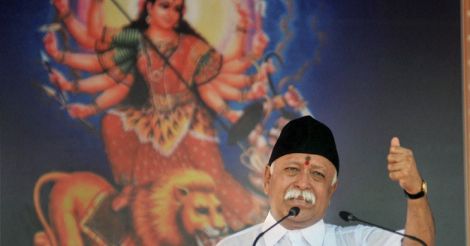While the Rashtriya Swayamsevak Sangh's stance on lifting the restrictions on the entry of women into temples is being hailed refreshing and progressive, the outfit's own record leaves one wondering how how sincere it is really on the issue.
The RSS' latest utterance comes in the wake of recent high-voltage debates and agitations over allowing the entry of women into the Sabarimala temple in Kerala and the Shani Shingnapur temple in Maharashtra.
But can the RSS change its stripes so fast, as fast as it can change the colour of its shorts? Even recently, as news reports show, the Sangh had vehemently opposed those who sought the right for women to enter the both the temples.
It's unfair to stop women from entering a temple, says RSS
In trying to march with the times, RSS may reshape India itself
'We move with times': RSS replaces khaki shorts with brown pants
Read: Women's entry in temples: Devaswom flays RSS volte-face
On the Shani temple row, the RSS mouthpiece had reportedly justified the age-old practice of not allowing women to enter the temple. The journal also condemned the women protesters for advancing 'wrong' arguments.
Similarly, in January when the question of women's entry into Sabarimala temple came up, following an apex court order, BJP Kerala chief Kummanam Rajasekharan, an RSS pracharak, was quick to allege a conspiracy behind the petition.
"There should be public debates on whether gender equality is observed in churches and mosques. Filing an affidavit in the Supreme Court during the LDF government's rule favouring women’s entry was a wrong precedence. Many people are commenting on the issue without understanding the facts about Sabarimala," Kummanam had said.
The RSS and its allies have always looked upon voices for gender equality as a threat to tradition and customs. Their idea of a Hindu nation has its base in Brahminical Hindutva, which is highly patriarchal. Calls to reform Hinduism have always evoked a standard response from these outfits: what about similar practices in other religions?
RSS chief Mohan Bhagwat's comments on rapes and a woman's role in society have to be recalled in this context. In January 2013, Bhagawat said rapes do not take place in rural India, but only urban India as it was an urban crime shaped by westernisation; a couple of days later while addressing a rally in Indore, he said a woman is bound by contract to her husband to look after him.
The two statements, in a sense, reflect the mentality of the rank and file of the outfit. That was highly visible when pro-Hindutva cyber warriors took heavily on a Keralite student-activist who wrote an article favouring the entry of women in Sabarimala.
It is this genie within itself that the RSS will have to confront when it calls for a change in traditions and practices. Changing shorts for pants may be easier than changing one's DNA.
In a carefully constructed sentence, the RSS has said that such sensitive issues should be resolved through discussion and dialogue and not through agitations. When the RSS calls for “discussion and dialogues” on the issue, one is left wondering how much radically progressive it can get, as some laudatory comments say. (The views expressed in the article are highly personal.)

























 RSS chief Mohan Bhagwat. File photo
RSS chief Mohan Bhagwat. File photo
Disclaimer
The comments posted here/below/in the given space are not on behalf of Manorama. The person posting the comment will be in sole ownership of its responsibility. According to the central government's IT rules, obscene or offensive statement made against a person, religion, community or nation is a punishable offense, and legal action would be taken against people who indulge in such activities.